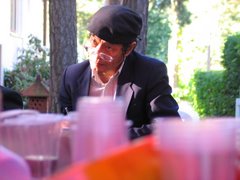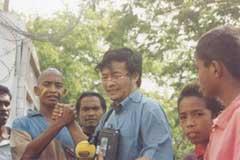
26 Oct. 2006
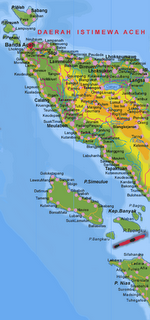
by Aboeprijadi Santoso
Much to the disappointment of many, the Susilo Bambang
Yudhoyono-Jusuf-Kalla government has missed the 2006 Nobel Peace Prize
just as it enters its third year. However, the fact that the prize was
not awarded to key figures involved in Aceh peace, could have been
expected. The implementation of the Helsinki pact signed last year is
unprecedented. This has been recognized precisely by not awarding the prize.
The Norwegian Nobel Committee's decision is both traditional and
innovative. As various peace efforts at state level were, as usual,
considered, they opened a radically new horizon by awarding Muhammad Yunus and the Grameen Bank, introducing what is seen as a contribution
at grass root level of the war against poverty to peace. It's not a new paradigm, though, but one whose importance is now recognized and emphasized.
Peace is thus no longer viewed as a matter of working toward resolving
conflicts at diplomatic level only. Situations on the ground could
matter as much, as the devils often lie in crucial details. In both
respects, though, Aceh peace may stand as a good example of, so far, a
successful settlement.
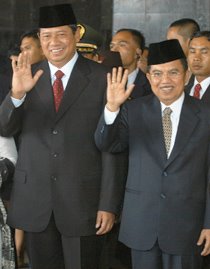
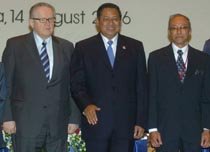
Since no progress has been made on the Middle East, one of world's
greatest headaches, it's fair to assume that Aceh, the only regional
conflict settled last year, must have been considered seriously.
President Susilo as well as GAM (Free Aceh Movement) top leader Hasan
di Tiro presided over the general discourse that led to the deal.
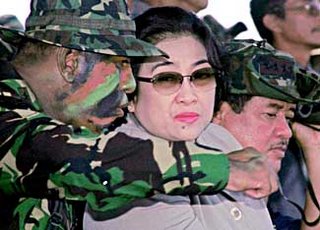
Susilo, the former general, had been particularly instrumental in two
ways: by isolating the havik general Ryamizard Ryacudu in order to
guarantee security on the ground, and by agreeing - albeit at the very
last minute - to GAM's key demand on local political parties.
Credit, however, should go to Vice-President Jusuf Kalla and his team
of five – significantly, all non-Javanese - who boldly pioneered a
breakthrough by initiating a confident-building approach since
mid-2003 and pushing toward a peace talk, and the peace-broker Martti
Ahtisaari whose authority and skills had been highly respected and
effective.


The former Finland's president Ahtisaari is an experienced diplomat
with a strong self-confidence - "very firm" and "father like",
according to both parties. Like him, though, the Noble institute views
peace and its nurturing ultimately depend on the conflicting parties –
not the mediator.
Noble Peace Prize winners are not necessarily those whom we believe to
have done the greatest service for world peace. Surely, they must have
made some contribution, however, the way the prizes were bestowed in
the name of Alfred Nobel suggests that it should carry - as it did in
recent past - a clear moral-political message. It should strengthen
the values related to the cause the winners pursued, and in doing so
encourage them toward the enhancement of peace, human rights and
democracy.
Since the chances to resolve conflicts vary, the resolutions obviously
cannot be expected to be readily visible, let alone credible. It
follows, even in cases where the issues have been settled, one has to
judge whether the solutions seem solid, or need to be pushed forward.

This, it seems, has been most critical: it is the ongoing processes
toward peace with greater, not lesser, degree of difficulties, rather
than some definite peace deals, that seem fit the mission of the Nobel
Peace Prize - which thus needs greater consideration.
A number of cases demonstrate the importance of this pattern. Bishop
F. Carlos Belo and J. Ramos-Horta had gone through a great deal of
troubles to campaign for the East Timorese legitimate right to
self-determination, yet their ideal seemed far from politically
`realistic' by 1996 - hence, they got the prize then.
Similarly, Nelson Mandela and Fredrik de Klerk were under heavy
pressures from inside and outside during their negotiation to
democratize South Africa when they were awarded the prize in 1993
– given the difficulties and critical situation, that was one long year
before Mandela was finally released from prison.
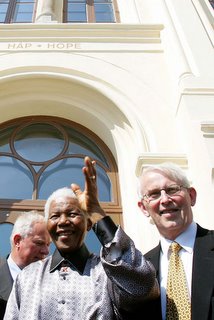
The Northern Ierland parties (John Hume and David Trimble), too, needed a strong push by being awarded the prize in 1998 as the peace talk gained momentum while the decommissioning had yet to be implemented; the latter, as it turned out, took years before it materialized. Likewise, it seemed no coincident, that Mikhail Gorbachov was awarded the prize for his role in ending the Cold War in the critical year of 1990; and the critical nature was soon demonstrated by the pro-communist – and Yelstin coups.
Seen from this point of view, it's only natural that Aung San Syu Kyii got the prize in 1991. Being imprisoned by a military junta, the Burmese pro-democra-tic leader and winner of the 1988 elections was unable to lead a campaign herself the way Belo and Ramos-Horta did. She thus deserved the prize.
Another clear example of peace-effort-in-a-critical-momentum as a crucial criterion for awarding the prize, however, was when it was given to Yasser Arafat, Shimon Peres and Yitzhak Rabin in 1994. Never before had a better chance emerged to achieve a settlement in the Israel-Palestine conflict, yet it was also feared that the situation remained precarious (which proved correct as the talk later failed) – hence the Nobel push.
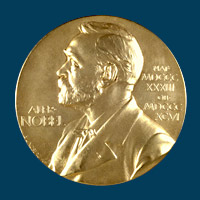
In short, no Nobel Peace Prize has in the last fifteen years been
awarded to a definite peace settlement. Instead it was consistenly
decided to push peace efforts which were at a critical moments or
facing great stumbling block.
Thus, Aceh did not, as some have argued, miss the prize because of the tsunami factor. It's true the tsunami had radically changed Aceh and made possible the Helsinki deal, but it should be noticed that the parties had in fact agreed to start talking only a week before the tsunami strucked.
Moreover, many, from the locals to European diplomats, who had been
skeptic at the outset, have in the end applauded and generally believe
in the peace pact and its implementation. No conflict has ever been
resolved, with its crucial parts implemented, within less than two
years as the Aceh issue.
So, why should anyone, with Nobel ideal in mind, give award to what is
seen as a successful conflict settlement, rather than encouraging
other important efforts toward peace, human rights and democracy?
Aceh peace has thus become a victim of its own success.
The writer is journalist with Radio Netherlands.
 26 Oct. 2006
26 Oct. 2006
 by Aboeprijadi Santoso
Much to the disappointment of many, the Susilo Bambang
Yudhoyono-Jusuf-Kalla government has missed the 2006 Nobel Peace Prize
just as it enters its third year. However, the fact that the prize was
not awarded to key figures involved in Aceh peace, could have been
expected. The implementation of the Helsinki pact signed last year is
unprecedented. This has been recognized precisely by not awarding the prize.
The Norwegian Nobel Committee's decision is both traditional and
innovative. As various peace efforts at state level were, as usual,
considered, they opened a radically new horizon by awarding Muhammad Yunus and the Grameen Bank, introducing what is seen as a contribution
at grass root level of the war against poverty to peace. It's not a new paradigm, though, but one whose importance is now recognized and emphasized.
Peace is thus no longer viewed as a matter of working toward resolving
conflicts at diplomatic level only. Situations on the ground could
matter as much, as the devils often lie in crucial details. In both
respects, though, Aceh peace may stand as a good example of, so far, a
successful settlement.
by Aboeprijadi Santoso
Much to the disappointment of many, the Susilo Bambang
Yudhoyono-Jusuf-Kalla government has missed the 2006 Nobel Peace Prize
just as it enters its third year. However, the fact that the prize was
not awarded to key figures involved in Aceh peace, could have been
expected. The implementation of the Helsinki pact signed last year is
unprecedented. This has been recognized precisely by not awarding the prize.
The Norwegian Nobel Committee's decision is both traditional and
innovative. As various peace efforts at state level were, as usual,
considered, they opened a radically new horizon by awarding Muhammad Yunus and the Grameen Bank, introducing what is seen as a contribution
at grass root level of the war against poverty to peace. It's not a new paradigm, though, but one whose importance is now recognized and emphasized.
Peace is thus no longer viewed as a matter of working toward resolving
conflicts at diplomatic level only. Situations on the ground could
matter as much, as the devils often lie in crucial details. In both
respects, though, Aceh peace may stand as a good example of, so far, a
successful settlement.

 Since no progress has been made on the Middle East, one of world's
greatest headaches, it's fair to assume that Aceh, the only regional
conflict settled last year, must have been considered seriously.
President Susilo as well as GAM (Free Aceh Movement) top leader Hasan
di Tiro presided over the general discourse that led to the deal.
Since no progress has been made on the Middle East, one of world's
greatest headaches, it's fair to assume that Aceh, the only regional
conflict settled last year, must have been considered seriously.
President Susilo as well as GAM (Free Aceh Movement) top leader Hasan
di Tiro presided over the general discourse that led to the deal.
 Susilo, the former general, had been particularly instrumental in two
ways: by isolating the havik general Ryamizard Ryacudu in order to
guarantee security on the ground, and by agreeing - albeit at the very
last minute - to GAM's key demand on local political parties.
Credit, however, should go to Vice-President Jusuf Kalla and his team
of five – significantly, all non-Javanese - who boldly pioneered a
breakthrough by initiating a confident-building approach since
mid-2003 and pushing toward a peace talk, and the peace-broker Martti
Ahtisaari whose authority and skills had been highly respected and
effective.
Susilo, the former general, had been particularly instrumental in two
ways: by isolating the havik general Ryamizard Ryacudu in order to
guarantee security on the ground, and by agreeing - albeit at the very
last minute - to GAM's key demand on local political parties.
Credit, however, should go to Vice-President Jusuf Kalla and his team
of five – significantly, all non-Javanese - who boldly pioneered a
breakthrough by initiating a confident-building approach since
mid-2003 and pushing toward a peace talk, and the peace-broker Martti
Ahtisaari whose authority and skills had been highly respected and
effective. 
 The former Finland's president Ahtisaari is an experienced diplomat
with a strong self-confidence - "very firm" and "father like",
according to both parties. Like him, though, the Noble institute views
peace and its nurturing ultimately depend on the conflicting parties –
not the mediator.
Noble Peace Prize winners are not necessarily those whom we believe to
have done the greatest service for world peace. Surely, they must have
made some contribution, however, the way the prizes were bestowed in
the name of Alfred Nobel suggests that it should carry - as it did in
recent past - a clear moral-political message. It should strengthen
the values related to the cause the winners pursued, and in doing so
encourage them toward the enhancement of peace, human rights and
democracy.
Since the chances to resolve conflicts vary, the resolutions obviously
cannot be expected to be readily visible, let alone credible. It
follows, even in cases where the issues have been settled, one has to
judge whether the solutions seem solid, or need to be pushed forward.
The former Finland's president Ahtisaari is an experienced diplomat
with a strong self-confidence - "very firm" and "father like",
according to both parties. Like him, though, the Noble institute views
peace and its nurturing ultimately depend on the conflicting parties –
not the mediator.
Noble Peace Prize winners are not necessarily those whom we believe to
have done the greatest service for world peace. Surely, they must have
made some contribution, however, the way the prizes were bestowed in
the name of Alfred Nobel suggests that it should carry - as it did in
recent past - a clear moral-political message. It should strengthen
the values related to the cause the winners pursued, and in doing so
encourage them toward the enhancement of peace, human rights and
democracy.
Since the chances to resolve conflicts vary, the resolutions obviously
cannot be expected to be readily visible, let alone credible. It
follows, even in cases where the issues have been settled, one has to
judge whether the solutions seem solid, or need to be pushed forward.
 This, it seems, has been most critical: it is the ongoing processes
toward peace with greater, not lesser, degree of difficulties, rather
than some definite peace deals, that seem fit the mission of the Nobel
Peace Prize - which thus needs greater consideration.
A number of cases demonstrate the importance of this pattern. Bishop
F. Carlos Belo and J. Ramos-Horta had gone through a great deal of
troubles to campaign for the East Timorese legitimate right to
self-determination, yet their ideal seemed far from politically
`realistic' by 1996 - hence, they got the prize then.
Similarly, Nelson Mandela and Fredrik de Klerk were under heavy
pressures from inside and outside during their negotiation to
democratize South Africa when they were awarded the prize in 1993
– given the difficulties and critical situation, that was one long year
before Mandela was finally released from prison.
This, it seems, has been most critical: it is the ongoing processes
toward peace with greater, not lesser, degree of difficulties, rather
than some definite peace deals, that seem fit the mission of the Nobel
Peace Prize - which thus needs greater consideration.
A number of cases demonstrate the importance of this pattern. Bishop
F. Carlos Belo and J. Ramos-Horta had gone through a great deal of
troubles to campaign for the East Timorese legitimate right to
self-determination, yet their ideal seemed far from politically
`realistic' by 1996 - hence, they got the prize then.
Similarly, Nelson Mandela and Fredrik de Klerk were under heavy
pressures from inside and outside during their negotiation to
democratize South Africa when they were awarded the prize in 1993
– given the difficulties and critical situation, that was one long year
before Mandela was finally released from prison.
 The Northern Ierland parties (John Hume and David Trimble), too, needed a strong push by being awarded the prize in 1998 as the peace talk gained momentum while the decommissioning had yet to be implemented; the latter, as it turned out, took years before it materialized. Likewise, it seemed no coincident, that Mikhail Gorbachov was awarded the prize for his role in ending the Cold War in the critical year of 1990; and the critical nature was soon demonstrated by the pro-communist – and Yelstin coups.
Seen from this point of view, it's only natural that Aung San Syu Kyii got the prize in 1991. Being imprisoned by a military junta, the Burmese pro-democra-tic leader and winner of the 1988 elections was unable to lead a campaign herself the way Belo and Ramos-Horta did. She thus deserved the prize.
Another clear example of peace-effort-in-a-critical-momentum as a crucial criterion for awarding the prize, however, was when it was given to Yasser Arafat, Shimon Peres and Yitzhak Rabin in 1994. Never before had a better chance emerged to achieve a settlement in the Israel-Palestine conflict, yet it was also feared that the situation remained precarious (which proved correct as the talk later failed) – hence the Nobel push.
The Northern Ierland parties (John Hume and David Trimble), too, needed a strong push by being awarded the prize in 1998 as the peace talk gained momentum while the decommissioning had yet to be implemented; the latter, as it turned out, took years before it materialized. Likewise, it seemed no coincident, that Mikhail Gorbachov was awarded the prize for his role in ending the Cold War in the critical year of 1990; and the critical nature was soon demonstrated by the pro-communist – and Yelstin coups.
Seen from this point of view, it's only natural that Aung San Syu Kyii got the prize in 1991. Being imprisoned by a military junta, the Burmese pro-democra-tic leader and winner of the 1988 elections was unable to lead a campaign herself the way Belo and Ramos-Horta did. She thus deserved the prize.
Another clear example of peace-effort-in-a-critical-momentum as a crucial criterion for awarding the prize, however, was when it was given to Yasser Arafat, Shimon Peres and Yitzhak Rabin in 1994. Never before had a better chance emerged to achieve a settlement in the Israel-Palestine conflict, yet it was also feared that the situation remained precarious (which proved correct as the talk later failed) – hence the Nobel push.
 In short, no Nobel Peace Prize has in the last fifteen years been
awarded to a definite peace settlement. Instead it was consistenly
decided to push peace efforts which were at a critical moments or
facing great stumbling block.
Thus, Aceh did not, as some have argued, miss the prize because of the tsunami factor. It's true the tsunami had radically changed Aceh and made possible the Helsinki deal, but it should be noticed that the parties had in fact agreed to start talking only a week before the tsunami strucked.
Moreover, many, from the locals to European diplomats, who had been
skeptic at the outset, have in the end applauded and generally believe
in the peace pact and its implementation. No conflict has ever been
resolved, with its crucial parts implemented, within less than two
years as the Aceh issue.
So, why should anyone, with Nobel ideal in mind, give award to what is
seen as a successful conflict settlement, rather than encouraging
other important efforts toward peace, human rights and democracy?
Aceh peace has thus become a victim of its own success.
The writer is journalist with Radio Netherlands.
In short, no Nobel Peace Prize has in the last fifteen years been
awarded to a definite peace settlement. Instead it was consistenly
decided to push peace efforts which were at a critical moments or
facing great stumbling block.
Thus, Aceh did not, as some have argued, miss the prize because of the tsunami factor. It's true the tsunami had radically changed Aceh and made possible the Helsinki deal, but it should be noticed that the parties had in fact agreed to start talking only a week before the tsunami strucked.
Moreover, many, from the locals to European diplomats, who had been
skeptic at the outset, have in the end applauded and generally believe
in the peace pact and its implementation. No conflict has ever been
resolved, with its crucial parts implemented, within less than two
years as the Aceh issue.
So, why should anyone, with Nobel ideal in mind, give award to what is
seen as a successful conflict settlement, rather than encouraging
other important efforts toward peace, human rights and democracy?
Aceh peace has thus become a victim of its own success.
The writer is journalist with Radio Netherlands.

